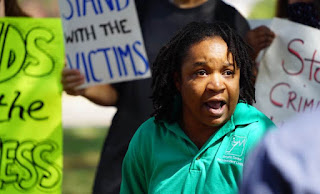Disability Rights Law was signed July 26, 1990
 Today is the 28th anniversary of the Americans with Disabilities Act. At the Benjamin Hooks Public Library in Memphis Tennessee the Memphis center for Independent Living, Disability Rights Tennessee, Clovernook and the Arc of the Mid-South got together to celebrate the disability rights law.
Today is the 28th anniversary of the Americans with Disabilities Act. At the Benjamin Hooks Public Library in Memphis Tennessee the Memphis center for Independent Living, Disability Rights Tennessee, Clovernook and the Arc of the Mid-South got together to celebrate the disability rights law.Carlene Leaper of the Arc Welcomed everyone. She reminded us about life in 1989, life before the American with Disabilities Act. Carlene mentioned people who could be told to leave a restaurant because they had a service animal and people that could not get into many places in their neighborhood. But today we have in America with Disabilities Act and many of those places are open to all of us today.
But, Ms. Leaper recognized that there still was work to be done.
Christina Clift asked the crowd how the ADA had help people get to the celebration today. The audience responded with MATAplus, parking and the accessible door. Christina went on to explain the ADA and tell us about what the different titles covered in our civil rights.
Christina also told about her experience going to Kroger. She would call Uber get the ride and she used an app to have the groceries she wanted selected and bagged before she arrived. Christina said she wasn't an expert on the ADA, but, her main point was that we must continue to fight for our civil rights.
Tim Redd, a former staff member at the Memphis Center for Independent Living told about his life and a little about his journey as a person with a disability.
“If I could have a shot,” said Tim, “anytime someone said I was an inspiration or motivation for them, I would be really, really drunk.”
Tim told about the day at doctor told him that he had type 2 diabetes. The doctor thought he would have to take insulin the rest of his life. But Tim didn't tell the doctor when he read about diabetes diet and he went to a gym. Tim said at the gym it was the first time the trainer had never worked with a person who used a wheelchair. Tim exercised and change how he ate. Tim professed everyone he had lost 40 pounds and then he no longer has diabetes.
Tim told about barriers that are still in the community. He told about his experience joining ADAPT and working for civil rights for people with disabilities. Tim talked about his introduction to disability rights activists using non-violence and civil disobedience to raise hell in Washington DC. He told everybody why they should support the Disability Integration Act.
There were also speakers who spoke about working with a disability, living with a disability, playing with a disability and faith groups. Carlene leaper followed by telling a personal story and suggesting that 28 years from now we all will note the progress of the ADA.
The celebration closed with a lunch for everyone and cake.





